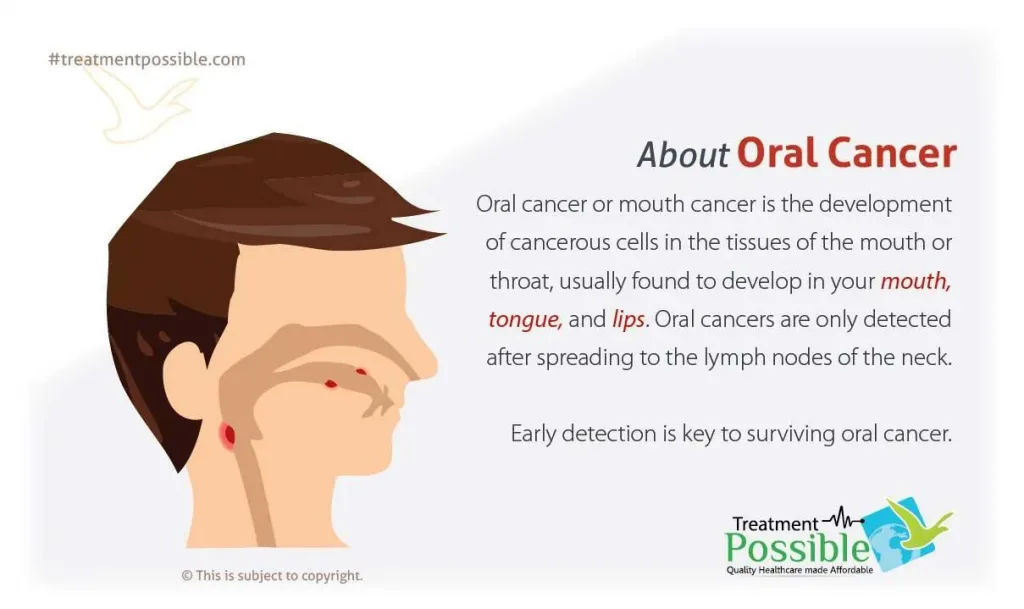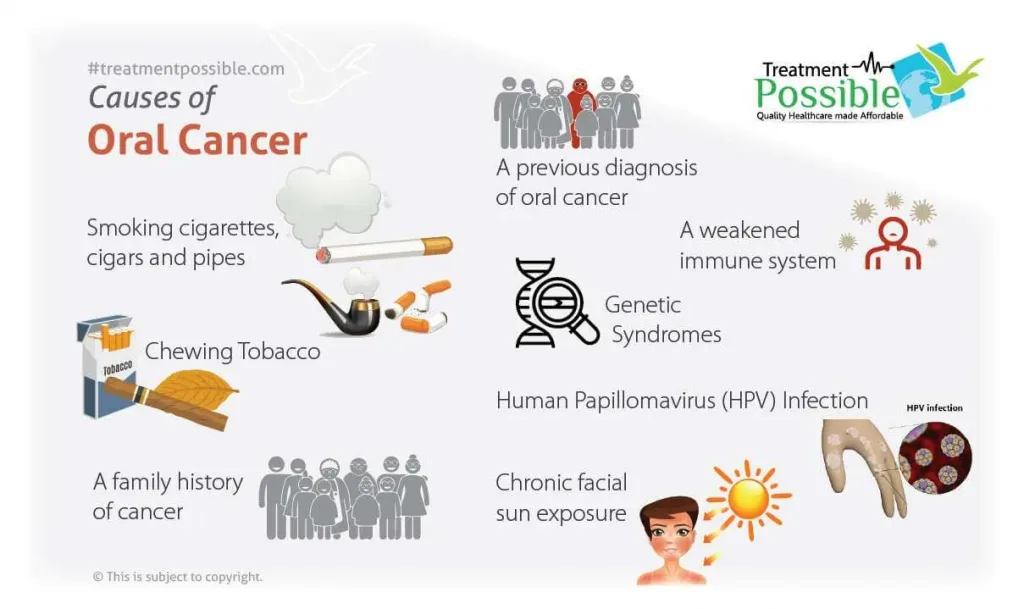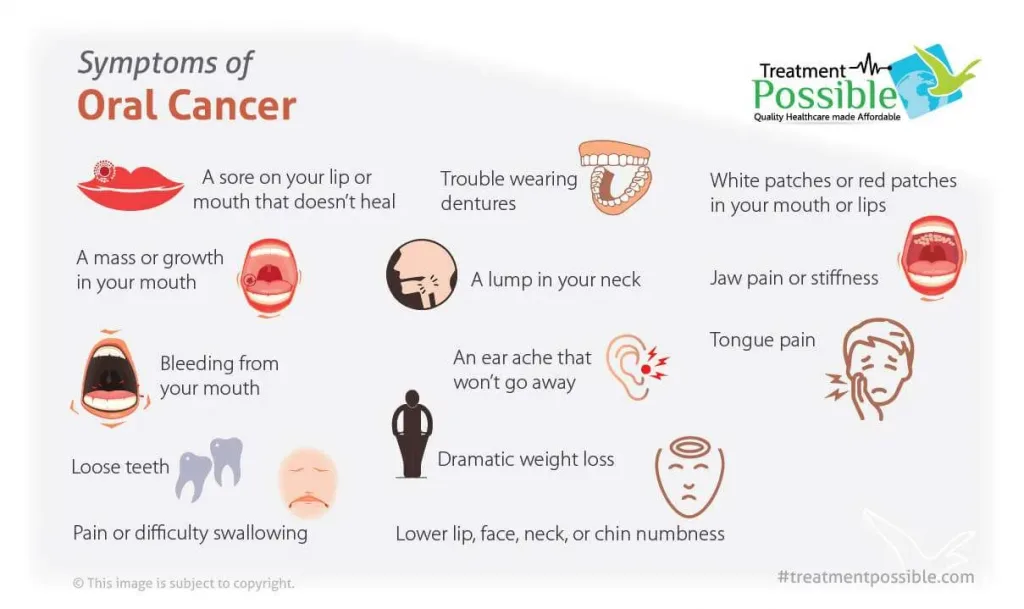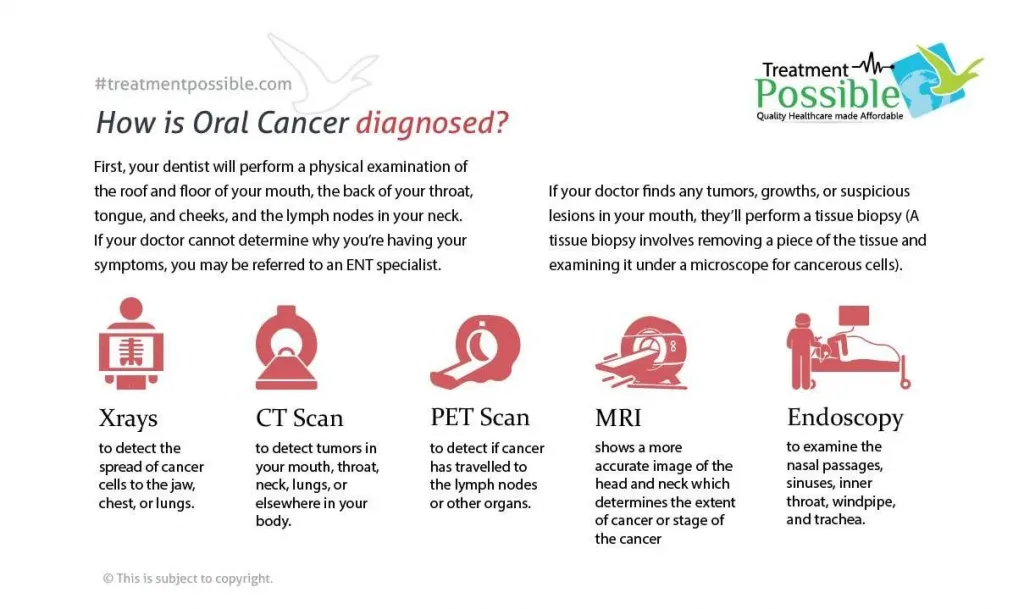Oral Cancer Treatment
Verified By: Dr. Donald John Babu (MBBS, MS, FCPS, MCh – Surgical Oncology, MRCS (UK), FICS)
What is Oral Cancer?
Oral cancer develops in the tissues of the mouth and throat. It is one type of head and neck cancer. Oropharyngeal cancer affects the back of the mouth and the throat lining. Oral cancers occur mostly in men than in women. Head and neck / oral cancers include cancers of the mouth (lip and tongue), the pharynx (or throat), the salivary gland, and the larynx (or voice box). The oral cancer or oral cavity cancer can develop in the following areas:
- lips
- tongue
- inner lining of the cheek
- gums
- roof of the mouth
- Floor of the mouth (under the tongue)

What are the Causes of Oral Cancer?
There are multiple reasons which cause the cancerous cells to grow in the mouth especially those who consume large amounts of alcohol and tobacco. Other causes include which may lead to oral cancer are:
- Smoking or chewing tobacco
- Using snuff, which comes from tobacco
- Regularly chewing betel nuts
- Excessive alcohol consumption
- Human papillomavirus (HPV) infection, such as HPV type 16
- Exposure of ultraviolet (UV) to the lips from the sun
- A family history of head and neck cancer
- Gastroesophageal reflux disease (GERD)
- Exposure to certain chemicals such as asbestos, sulfuric acid, and formaldehyde

What are the Symptoms of Oral Cancer?
Symptoms of oral cancer include:
- A sore on your lip or mouth that will not heal
- A mass or growth anywhere in your mouth
- Bleeding from your mouth
- Loose teeth
- Poorly fitting dentures
- A lump in your neck
- An earache that won’t go away
- Unintentional weight loss
- Lower lip, face, neck, or chin numbness
- White, red and white, or red patches in or on your mouth or lips
- A hoarse voice
- Jaw pain or stiffness
- Tongue pain
- Difficulty chewing or swallowing
- Difficulty moving the tongue or jaw

It is necessary to take immediate action if you have any of the above symptoms.
Are you Experiencing any of the above Symptoms?
Consult an Experienced Doctor online for a free diagnosis and plan your treatment in India.
How is Oral Cancer Diagnosed?
First, your dentist will perform a physical examination of the roof and floor of your mouth, the back of your throat, tongue, and cheeks, and the lymph nodes in your neck. If your doctor cannot determine why you’re having your symptoms, you may be referred to an ENT specialist.
If your doctor finds any tumors, growths, or suspicious lesions in your mouth, they’ll perform a tissue biopsy (A tissue biopsy involves removing a piece of the tissue and examining it under a microscope for cancerous cells).
Your doctor may ask you to perform one or more of the following tests:
- X-rays to detect the spread of cancer cells to the jaw, chest, or lungs.
- CT scan to detect tumors in your mouth, throat, neck, lungs, or elsewhere in your body
- PET scan to detect if cancer has travelled to the lymph nodes or other organs
- MRI scan shows a more accurate image of the head and neck which determines the extent of cancer or stage of the cancer
- An endoscopy to examine the nasal passages, sinuses, inner throat, windpipe, and trachea.

What are the Oral Cancer Stages?
There are four stages of oral cancer:
- Stage I: The tumor is 2 centimeters (cm) or smaller, and cancer hasn’t spread to the lymph nodes.
- Stage II: The tumor is between 2-4 cm, and cancer hasn’t spread to the lymph nodes.
- Stage III: The tumor is either larger than 4 cm and hasn’t spread to the lymph nodes, or is any size and has spread to one lymph node, but not to other parts of the body.
- Stage IV: Tumors are any size and the cancer cells have spread to nearby tissues, the lymph nodes, or other parts of the body (metastasis cancer).
Want more clarification about medical expense & treatment plan?
Consult an Experienced Doctor online for a free diagnosis and Plan Your Oral Cancer Treatment In India
What are the Treatment options for Oral Cancer?
Treatment for oral cancer may vary depending on the type, location, and stage of cancer at diagnosis, the doctor’s will prepare your treatment plan accordingly:
- Option 1 – Surgery for early-stage oral cancer is done to remove the tumor and cancerous lymph nodes in the mouth or throat.
- Option 2 – Using Radiotherapy to destroy the cancer cells in the mouth. This involves a doctor aiming radiation beams at the tumor once or twice a day, five days a week, for two to eight weeks. Treatment for advanced stages will generally involve a combination of chemotherapy and radiation therapy.
- Option 3 – Use of Chemotherapy drugs that kill cancer cells. The medicine is given to you either orally or through an intravenous (IV) line. Chemotherapy can be done on an outpatient basis or hospitalization.
- Option 4 – Targeted Therapy can be effective in both early and advanced stages of mouth cancer. Targeted therapy drugs stop the growth of cancer cells in the mouth by binding to specific proteins on cancer cells.
Nutrition plays an important role in the treatment of oral cancer. Many treatments make it difficult or painful to eat and swallow, therefore you should discuss your diet with your doctor accordingly. You need to get the advice of a nutritionist can help you plan a food menu that will be gentle on your mouth and throat, and will provide your body with the calories, vitamins, and minerals it needs to heal.
What are the risks associated with the Oral Cancer Treatment?
The removal of larger tumors from the mouth could affect your ability to chew, swallow or talk. You might also need reconstructive surgery to rebuild the bones and tissues of your face which were removed during the surgery. Also, it is necessary to remember that the side effects are due to the medications and techniques used to treat oral cancer and hence are temporary and will soon disappear once the treatment is completed.
Radiation therapy will have a negative effect on the body and some of the side effects of radiation include:
- A sore throat or mouth
- Dry mouth and loss of salivary gland function
- Tooth decay
- Nausea and vomiting
- Sore or bleeding gums
- Skin and mouth infections
- Jaw stiffness and pain
- Problems wearing dentures
- Fatigue
- A change in your ability to taste and smell
- Changes in your skin, including dryness and burning
- Weight loss
- Thyroid changes
While Chemotherapy drugs are effective in destroying the cancer cells in the mouth but they are also very toxic to the noncancerous cells and this can cause side effects such as:
- Hair loss
- Painful mouth and gums
- Bleeding in the mouth
- Severe anemia
- Weakness
- Poor appetite
- Nausea
- Vomiting
- Diarrhea
- Mouth and lip sores
- Numbness in the hands and feet
Recovering from targeted therapies is usually minimal. The side effects of this treatment can include:
- Fever
- Headache
- Vomiting
- Diarrhea
- An allergic reaction
- Skin rashes
Although these treatments have side effects, they are necessary to get rid of cancer so you do not need to worry. Your doctor will discuss the side effects and help you weigh the pros and cons of your treatment options.
Reconstruction and Rehabilitation after Oral Cancer Treatment:
Those who are diagnosed with advanced oral cancer will need reconstructive surgery and rehabilitation to assist with eating and speaking during recovery. Reconstruction can involve dental implants or grafts to repair the missing bones and tissues in the mouth or face. Artificial palates are used to replace any missing tissue or teeth. Rehabilitation is also necessary for cases of advanced cancer. Speech therapy could be provided after the surgery until you reach the maximum level of improvement.
What is the Oral Cancer Treatment Cost in India?
The cost of treatment for oral cancer in India is 60% – 70% cheap compared to other countries like U.S.A, United Kingdom, Singapore, South Africa, etc. Due to our long-standing association with the best hospitals and surgeons in India, we ensure that your oral cancer treatment is done in the best way possible while keeping the treatment cost affordable.
| Treatment Options | Cost (USD) |
|---|---|
| Diagnosis | $400 |
| Pet Scan | $250 |
| Chemotherapy* | $400 – $800 |
| Radiation Therapy* | $3200 |
| Surgery | $4000 – $5000 |
We have been guiding patients for treatment in India for more than a decade thus, we recognize the significance of excellent health and well-being of our guests by preferring association with top oncologists and the best hospitals for Oral cancer treatment in India. We encourage you to educate yourself about the treatment of mouth cancer and then make an informed decision. An individually allocated case manager takes personalized interest to design a tailor-made treatment plan with the doctor for every guest and provide the best possible treatment for mouth cancer while keeping the cost affordable
For an early response from a case manager, you can contact us via our email: care@treatmentpossible.com. Treatment Possible invites you for a Get a consultation with the Top Oncologists in India with the assurance of hassle-free arrangements for examinations, procedures, recovery, travel and stay.
